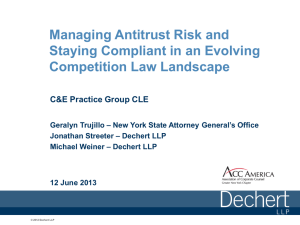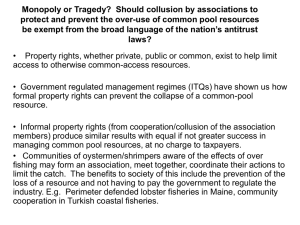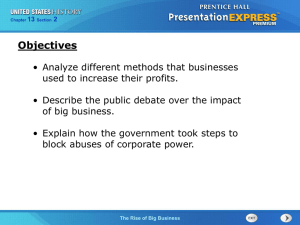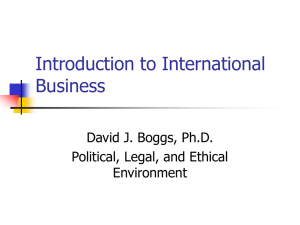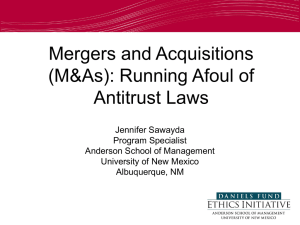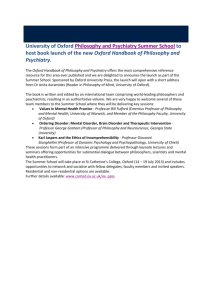Microsoft Word 2007
advertisement
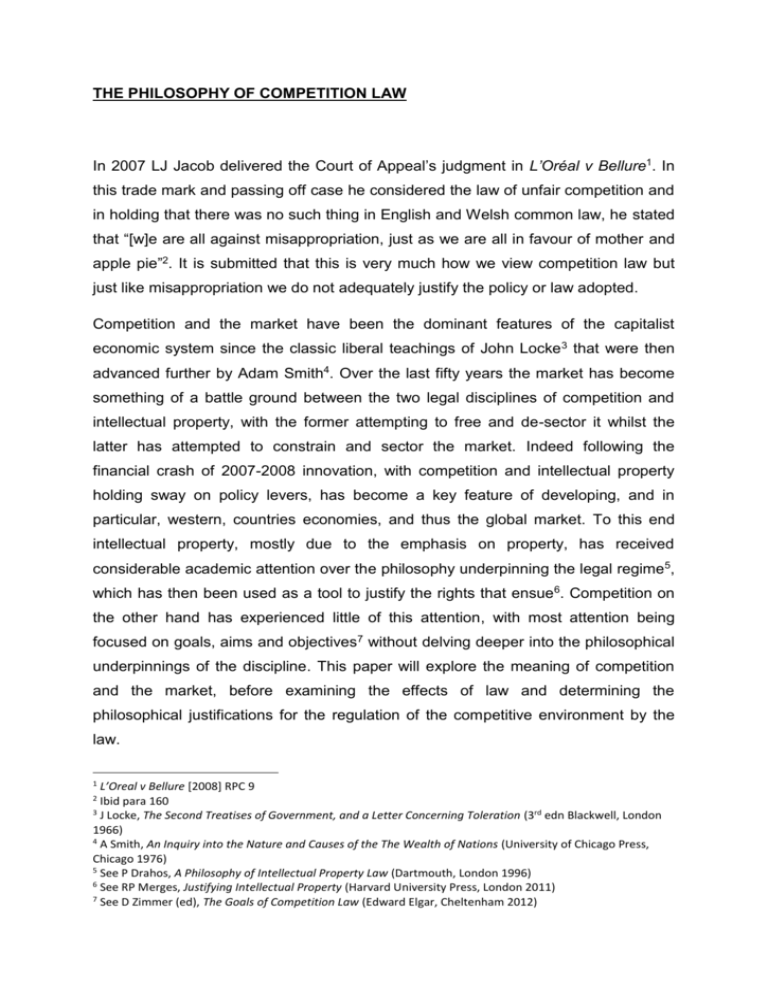
THE PHILOSOPHY OF COMPETITION LAW In 2007 LJ Jacob delivered the Court of Appeal’s judgment in L’Oréal v Bellure1. In this trade mark and passing off case he considered the law of unfair competition and in holding that there was no such thing in English and Welsh common law, he stated that “[w]e are all against misappropriation, just as we are all in favour of mother and apple pie”2. It is submitted that this is very much how we view competition law but just like misappropriation we do not adequately justify the policy or law adopted. Competition and the market have been the dominant features of the capitalist economic system since the classic liberal teachings of John Locke 3 that were then advanced further by Adam Smith4. Over the last fifty years the market has become something of a battle ground between the two legal disciplines of competition and intellectual property, with the former attempting to free and de-sector it whilst the latter has attempted to constrain and sector the market. Indeed following the financial crash of 2007-2008 innovation, with competition and intellectual property holding sway on policy levers, has become a key feature of developing, and in particular, western, countries economies, and thus the global market. To this end intellectual property, mostly due to the emphasis on property, has received considerable academic attention over the philosophy underpinning the legal regime5, which has then been used as a tool to justify the rights that ensue 6. Competition on the other hand has experienced little of this attention, with most attention being focused on goals, aims and objectives7 without delving deeper into the philosophical underpinnings of the discipline. This paper will explore the meaning of competition and the market, before examining the effects of law and determining the philosophical justifications for the regulation of the competitive environment by the law. 1 L’Oreal v Bellure [2008] RPC 9 Ibid para 160 3 J Locke, The Second Treatises of Government, and a Letter Concerning Toleration (3rd edn Blackwell, London 1966) 4 A Smith, An Inquiry into the Nature and Causes of the The Wealth of Nations (University of Chicago Press, Chicago 1976) 5 See P Drahos, A Philosophy of Intellectual Property Law (Dartmouth, London 1996) 6 See RP Merges, Justifying Intellectual Property (Harvard University Press, London 2011) 7 See D Zimmer (ed), The Goals of Competition Law (Edward Elgar, Cheltenham 2012) 2 PERFECT COMPETITION AND THE MARKET Maurice Stücke asked, “What is competition?” recently, without really providing an adequate answer8. Competition is a relatively simple concept9. In a perfectly competitive market there are a large number of buyers and sellers with perfect information, producing homogenous goods and services, and with no barriers to entry or exit to or from the market10. The market under perfect competition provides optimum allocative and productive efficiency11, with consumer welfare maximised, a measure aimed specifically at the limited group classified as consumers rather than the wider society in general. Much of the economic analysis of competition policy and the effects of it are based on perfect competition. Furthermore this has been enthusiastically embraced by some lawyers. Unfortunately perfect competition and the resultant perfect market are for the most part illusions, never to occur in the real world. The assumptions are theoretical and unlikely to be replicated in the practical world. Indeed as Whish points out, perfect competition will lie at one end of a scale with monopoly at the other 12. Perfect competition with its rational economic individuals acting in a rational marketplace in a wholly rational manner has recently been attacked form a new branch of economic analysis, behavioural economics13, based on the psychology of human beings and game theory, which demonstrates that humans rarely behave rationally. The result of leaving the market to function devoid of legal and regulatory control is clearly demonstrated by the “Robber Barons”14 of the nineteenth century that led to the adoption of the Sherman Act in the USA. 8 ME Stücke, ‘What is Competition?” in ibid 27 R Whish, Competition Law (7th edn OUP, Oxford 2012) 4. See also RM Steuer, ‘The Simplicity of Antitrust Law’ (2012) 14 University of Pennsylvania Journal of Business Law 543 where antitrust law is summarised as combating bullying and ganging up. 10 Whish, Competition Law (n 9) 4 11 Ibid 5 12 Ibid 8 13 AP Reeves, ME Stücke, ‘Behavioral Antitrust’ (2011) 86 Indiana Law Journal 1527 14 For a layman’s account see T McNeese, The Robber Barons and the Sherman Antitrust Act (Chelsea House Publishers 2009). For a more robust legal account see WD Collins, ‘Trusts and the Origin of Antitrust Legislation’ (2013) 81 Fordham Law Review 2279 9 LEGAL REGULATION It is at the point of failure of the market that the law steps in. This “interference” with what many consider to be the natural order of the market needs to be justified, especially when it is frequently stated that competition is the cornerstone of the capitalist economic system. However, competition takes place not just in the bubble of the market but is conducted by humans, often working through businesses, that impacts on other human beings within the larger environment of society in general. As such the law has been defined by Fuller as ‘the enterprise of subjecting human conduct to the governance of rules’15 and taken further as ‘the human attempt to establish social order as a way of regulating and managing human conflict’ 16. The latter definition it is suggested is particularly apt for antitrust, particularly when it is pointed out that competition law is attempting to combat “two of the most innate proclivities in human nature”17. The laws adopted tend to regulate competition in three ways. The first is through public civil regulation where an independent national competition authority is created with the duties and powers to regulate anti-competitive business activities. Second is through private civil enforcement where natural and legal persons are empowered to enforce their rights against other anti-competitive natural and legal persons. Finally is through the criminalisation of certain anti-competitive activities by individuals. All three processes impinge on the free working of the market, and create duties and rights for civil and criminal enforcement bodies, businesses and individuals. Much of the debate on the basis for competition law has centred around the goals, aims and objectives of competition policy18. Indeed the debate since the 1960s became very narrow, particularly after Bork19 argued so vociferously for consumer welfare as wealth maximisation being the only goal of competition law, which was taken up by the Supreme Court of the USA. However, goals without any underpinning are merely empty vessels, unanchored and liable to blow free in a gale. This is the case with consumer welfare with the consumer taking on a mythical and imaginary standard and welfare capable of meaning all things to all people, 15 LL Fuller, The Morality of Law (Yale University Press 1969) 96 D Beyleveld, R Brownsword, Law as a Moral Judgment (Sweet & Maxwell, London 1986) 2 17 Steuer, ‘The Simplicity of Antitrust Law’ (n 8) 543 18 See (n7) 19 R Bork, The Antitrust Paradox: A Policy at War With Itself (Basic Books, New York 1978) 16 grounded in ideological belief rather than philosophical opinion. The result has been that the protection of consumer welfare has lost its grounding within the bigger picture of the protection of society. For example if two firms wish to merge then they will be allowed to if consumer welfare, as an overall concept, is increased. If one company though produced lower quality products at a lower price that were affordable to lesser well-off customers, but following the merger these products were not produced anymore because of greater efficiency and wealth maximisation, then those previous customers would not be customers anymore and could be taken out of the equation. The result is a redistribution of wealth not to those with less but to those with more, thereby perpetuating inequality in society20. It is suggested therefore that the basis for the justification of competition policy and law has to be from first principles, examining different philosophical approaches to determine the best philosophy to underpin antitrust. This is an area of little scholarly interest so far but as Peritz21 points out, much of the direction of competition law and policy over the twentieth century was towards correlating competition policy with private property rights. That then links intellectual property law even more closely with competition law, and as a consequence antitrust’s philosophical underpinnings must be examined. Indeed it is submitted that this needs to be attacked from two angles: that of political philosophy; followed by, legal philosophy. POLITICAL PHILOSOPHY As already established the first entry into the antitrust arena is at the political level and so it is logical to begin by considering alternative political philosophical models. The first is the classic liberal theories of Locke and Smith22 in which individual property rights are natural rights derived from labour. This can be viewed alongside Kant’s Universal Principle of Right23, taken further by Hegel24 and more recently by Radin25, in which property rights are argued as being necessary as the basis of 20 AB Atkinson, Inequality: What Can Be Done? (Harvard University Press, London 2015) 124 RJR Peritz, Competition Policy in America: History, Rhetoric, Law (OUP, Oxford 1996) 22 See J Desautels-Stein, ‘The Market as a Legal Concept’ (2012) 60 Buffalo Law Journal 387 23 See Merges, Justifying Intellectual Property (n 6) 90 24 GWF Hegel, The Philosophy of Right (Clarendon Press, Oxford 1952) 25 MJ Radin, ‘Property & Personhood’ (1982) 34 Stanford LR 957 21 human freedom or personhood. As Merges26 points out however, both Locke’s provisos and Kant’s universal Principle of Right limit property rights when they heavily impact on other individuals’ concerns and activities. This can be seen as a first step towards distributive justice, the theories of Rawls27, and a move towards a more societal, inclusive and egalitarian property right. This culminates in the communitarian philosophies that grew in the 1970s and 1980s, epitomised by Walzer28, MacIntyre29, Sandel30 and Taylor31. Instead of property rights focusing on the individual, and the atomised individual of Rawls’ theory, the communitarian philosophical thought focuses on the community nature of such rights. This has culminated in Sandel’s What Money Can’t Buy: The Moral Limits of Markets32. On the other hand neo-liberal orthodoxy, as exemplified by Hayek and Friedman, suggest that the individual is key, the free-market essential, and the State should have as little input as possible. LEGAL PHILOSOPHY These leads neatly onto the two distinctions within the legal philosophical tradition – should law be underpinned by morals (the natural law thesis) or should law and morals be distanced (legal positivism). The former is exemplified by Finnis 33 and his exploration of the law through practical reason and the neo-Kantian arguments of Beyleveld and Brownsword34, whilst he latter through Hart35 and more recently Raz36 and finally the attempt at a middle way by Dworkin37. 26 Merges, Justifying Intellectual Property (n 6) 102 J Rawls, A Theory of Justice (2nd edn OUP, Oxford 1999) and J Rawls, Political Liberalism (expanded edn Columbia University Press, New York 2005) 28 M Walzer, Spheres of Justice: A Defence of Pluralism and Equality (Basic Books, New york 1983) 29 AC MacIntyre, After Virtue (University of Notre Dame, Notre Dame 1984) 30 M Sandel, Liberalism and the Limits of Justice (CUP, Cambridge 1998) 31 C Taylor, Sources of the Self (Harvard University Press, London 1992) 32 M Sandel, What Money Can’t Buy: The Moral Limits of Markets (Allen Lane, London 2012) 33 J Finnis, Natural Law and Natural Rights (Clarendon Press, Oxford 1980) 34 (n 16) 35 HLA Hart, The Concept of Law (3rd edn OUP, Oxford 2012) 36 J Raz, The Authority of Law: Essays on Law and Morality (2nd edn OUP, Oxford 2009) 37 R Dworkin, Taking Rights Seriously (Duckworth, London 1978) 27 The liberal/neo-liberal stance would suggest that the law, as regulation by the State, should be as limited as possible. To a certain extent this can be equated with the legal positivist position where law sets rules but such rules are not underpinned by morality or contain substantive values. On the other hand, Kantian philosophy is grounded in morals and ethics, as is the idea of distributive justice. This sits far more easily on the side of natural law rather than the neo-liberal position. PHILOSOPHY AND ANTITRUST What then is the best fit for antitrust? The neo-liberal stance would tend to suggest less of a role for the State, a scaling back of government regulation and oversight, and an enhanced role for private enforcement. This to a certain extent is reflected in the position in the USA since the 1980s and the dominance of Chicago economics. However, there have been some attempts to question this position, certainly since the 2007-2008 fiscal crash38, and notably by Robert Pitofsky39, Bruce Warhaugh40 and Maurice Stücke. Indeed Stücke has raised the questions of the relationship between morality and antitrust41, though limited to the area of criminalisation, and asked, “Is competition always good?”42. These questions must be welcomed but it is suggested that Stücke’s arguments fail to start from first principles by failing to determine what is meant by morality and establishing a definition of good and thereby undermine his consideration of the questions he asks. Ayal43 has approached the concerns of antitrust from a perspective of fairness, balancing the considerations of monopolists against the considerations of all affected persons, not just consumers, to create a new moral outlook. This approach is again commendable but again lacks credence by failing to determine the meaning of “moral” and the 38 RA Posner, A Failure of Capitalism: The Crisis of ’08 and the Decent Into Depression (Harvard University Press, London 2009) 39 R Pitofsky (ed), How the Chicago School Overshot the Mark: The Effect of Conservative Economic Analysis on US Antitrust (OUP, Oxford 2002) 40 B Wardhaugh, ‘A Normative Approach to the Criminalisation of Cartel Activity’ (2012) 32 LS 369 41 ME Stücke, ‘Morality and Antitrust’ (2006) 3 Columbia Business Law Review 443 42 ME Stücke, ‘Is Competition Always Good?’ (2013) 1 Journal of Antitrust Enforcement 162 43 A Ayal, Fairness in Antitrust: Protecting the Strong From the Weak (Hart Publishing, Oxford 2014) philosophy underpinning it. Black in 200544 suggested that he would analyse competition law through a philosophical approach, but on closer inspection this was merely based on economics and not philosophy. Finally in Wardhaugh’s analysis, he uses the philosophy of JS Mill and John Rawls to establish a normative liberal justification for criminal law as it applies to antitrust, rather than as a justification for competition law45. The consideration of morality, definitions of “good” and fairness is firmly situated in the realm of philosophy, and it is suggested that this is where the debate about the meaning of competition and antitrust needs to start. Commencing an argument from the goals of antitrust is misguided, as the philosophy of competition law must be determined first, and from where the goals and rules of antitrust will flow. For 125 years the cart has been ahead of the horse, leading to competition drifting and being hijacked by fashionable economic theories. To make sense of the future direction of competition law for the benefit of society as a whole then antitrust needs anchoring and it is philosophy that provides the flukes. It is imperative that this grounding is established because as stated by Justice Marshall in the US Supreme Court, competition law is “the Magna Carta of free enterprise”46. 44 O Black, Conceptual Foundations of Antitrust (CUP, Cambridge 2005) 40 (n 40) 371 46 United States v Topco Associates 405 U.S. 596, per Marshall J 45
